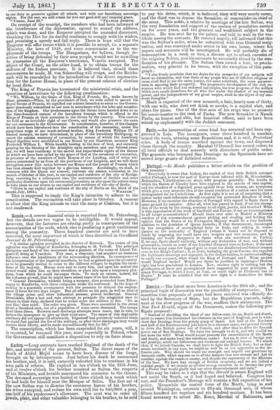Iligask,—A. severe financial crisis is reported from St. Petersburg, but
the details are too vague to be intelligible. It would appear, however, that the factories are closing party in consequence of the emancipation of the serfs, which also is producing a great excitement among the peasantry. Three hundred imeutes are said to have occurred, the most important of which is thus described in the official -Journal de St. Pitersbourg "A similar agitation prevailed in the district of Kerensk. The centre of this agitation was the village of Kandievka, belonging to M. Velkoff. The principal instigator and head of the movement was a peasant, of the name of Leonti Yd. gostseff, living at Vyssokoie. This man, a dissenter, had acquired an immense influence over the inhabitants of the surrounding districts. In consequence of his interpretation of the imperial manifesto, he had so gained upon the peasantry as to be generally invited to come to the different villages to explain the inten- tions of his majesty. Horses were sent to carry him, and upon his arrival the crowd would raise him on their shoulders, or place him upon a temporary plat- form, from which he could harangue them. To such an extent, Indeed, did his influence prevail, that he might have raised taxes if he bad chosen. " General Dreniakine, without losing a moment, then proceeded from Tcher- nogag to Kandievka, with three companies under his command. In the hope of coming to a peaceable arrangement with the peasants lie delayed the employ- ment of force for two days longer. But all efforts on his part, as well as that of the village priest and other influential persons, proved ineffectual. General Dreniakine, after a last and vain attempt to persuade the misguided men to return to their duty, declared that he would order the soldiers to tire. Do as you like,' they cried. The order was given. There were assembled in the street about a thousand men, out of a population of some seven thousand. The troops fired three times. Between each discharge attempts were made, but in vain, to induce the insurgents to give up their resistance. The cause of this deplorable obstinacy did not appear till afterwards. Y‘gostseff had previously exhorted them to stand fast against the fire of the military, as after three discharges they would receive their liberty, and be made unconditionally free for life."
The conscription, which has been suspended for six years, will, it is reported, be resumed this year, more especially in Poland, where the Government still manifests a disposition to rely on force alone.






























 Previous page
Previous page